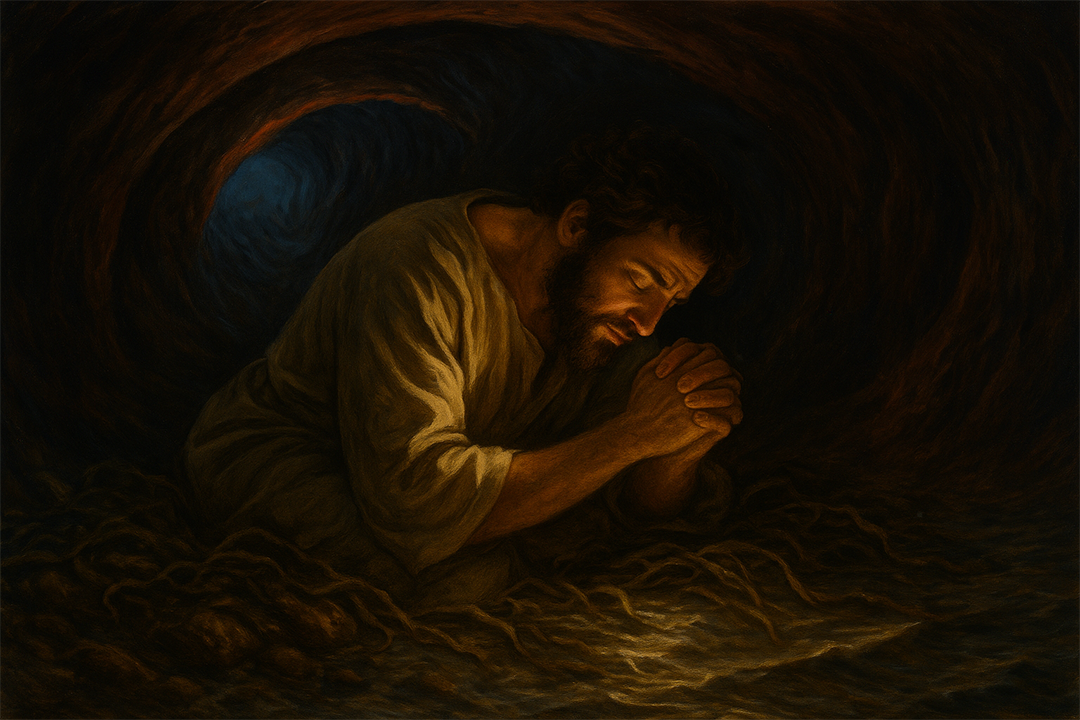One of the most misunderstood verses in the Old Testament
“Now the Lord provided a huge fish to swallow Jonah, and Jonah was in the belly of the fish three days and three nights.” — Jonah 1:17 (NIV)
Read Jonah 2:1-10 on Bible.com
The text doesn’t say whale. It says huge fish, or in Hebrew, דָּג גָּדוֹל (dag gadol) — a great or large sea creature. And regardless of its species, the point isn’t zoological — it’s theological. This was not punishment. This was provision.
“The Lord provided…”
The Hebrew word here is מָנָה (manah) — to appoint or ordain.
This fish was not an accident. It was a divine appointment.
Jonah had tried to run from God’s presence, but God met him in the waters. When Jonah sank—literally and spiritually—God prepared something living, something massive, to catch him. The fish wasn’t judgment. The fish was mercy.
And then we’re told something else significant:
“…and Jonah was in the belly of the fish three days and three nights.”
This timing matters. Jesus Himself pointed to it:
“For as Jonah was three days and three nights in the belly of a huge fish,
so the Son of Man will be three days and three nights in the heart of the earth.” — Matthew 12:40 (NIV)
Jesus is drawing a prophetic thread here. Jonah’s time in the depths was a shadow of the death, burial, and resurrection of Christ.
Jonah was cast into chaos for his disobedience.
Jesus entered the grave for our disobedience.
Jonah’s deliverance came through a fish.
Ours came through a cross and an empty tomb.
Jonah’s Prayer: A Cry from the Depths (Jonah 2:1–10)
Let’s slow down and sit in the belly of the fish with Jonah for a moment. (Or in my case, the War Room)
Jonah 2:1 says:
“From inside the fish Jonah prayed to the Lord his God.”
It’s only now—after running, after sleeping through a storm, after being thrown overboard—that Jonah finally prays. But what’s remarkable is how he prays.
He begins by quoting pieces of Scripture — mostly the Psalms. In fact, nearly every line of Jonah’s prayer echoes a psalm:
- “In my distress I called to the Lord, and he answered me.” (cf. Psalm 18:6)
- “The engulfing waters threatened me…” (cf. Psalm 69:1–2)
- “To the roots of the mountains I sank down…” (cf. Psalm 88:6)
- “But You, Lord my God, brought my life up from the pit.” (cf. Psalm 30:3)
Why does Jonah quote psalms?
Because when you’re at the bottom, sometimes you don’t have the words. You may not know what to pray. So you borrow them from scripture. And God honors that.
Jonah, sinking and scared, turned to what he knew — the prayers of his ancestors. He let the Word of God give voice to his desperation. It wasn’t poetic or perfect — but it was honest.
Rock Bottom Becomes Holy Ground
“To the roots of the mountains I sank down;
the earth beneath barred me in forever.
But you, Lord my God, brought my life up from the pit.” — Jonah 2:6
Jonah’s not just describing geography—he’s confessing surrender. He is literally and spiritually at rock bottom. And in that place, something happens:
“But You, Lord my God…”
This is the turning point. Jonah stops narrating his suffering and starts recognizing God’s mercy. And notice what follows:
“When my life was ebbing away, I remembered you, Lord, and my prayer rose to you…” (v. 7)
That’s repentance. That’s faith being resurrected in a fish’s belly.
The Most Underrated Miracle in Jonah
“And the Lord commanded the fish, and it vomited Jonah onto dry land.” — Jonah 2:10
Let’s not skip over this. God didn’t just command a fish to swallow Jonah. He also commanded it to spit him out.
And yes — it says vomit. Crude, yes. But deeply symbolic.
Sometimes, God’s deliverance isn’t glamorous. It’s messy, humbling, and unexpected. Jonah didn’t step onto dry land like a triumphant hero. He came out smelling like fish guts, seaweed still stuck in his hair, and clothes ruined. But he was free. He had been delivered.
The vomit wasn’t shame… It was a second chance.
A Mirror, Not a Fish Tale
As our Pastor said, this is not a story about a fish.
It’s a mirror — reflecting our own rebellion, our rock bottom moments, and our desperate need for God’s mercy.
Reflections
- What are you running from?
- What storms might God be allowing to turn you around?
- What fish has He provided—not to punish, but to preserve you?
And more importantly:
Are you ready to pray again? Even if it means borrowing someone else’s words until you can find your own?
Final Thoughts
If God can hear Jonah from the depths of a fish at the bottom of the sea…
He can hear you from wherever you are.
Even when you’re sinking, He’s already preparing your deliverance.
And when that moment comes, even if it feels like being spit out onto shore, don’t mistake the method for the mercy.
God is still writing your redemption.
Watch the Sermon that Inspired this Post
Gwinnett Church: The Book of Jonah Part 2: A Cry From the Deep


Leave a Reply